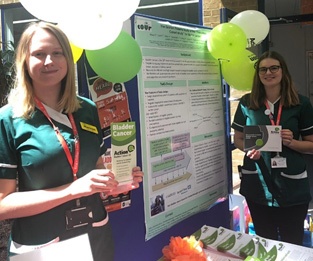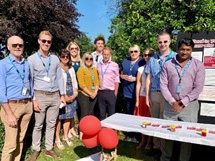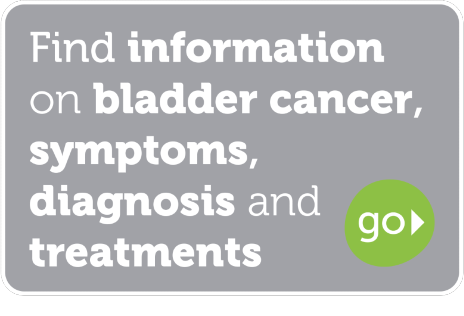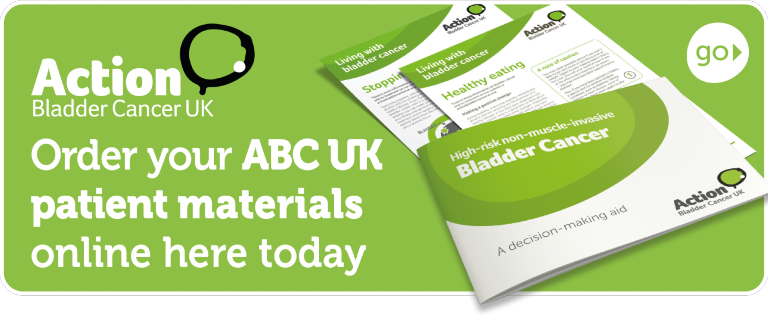ABC UK Improving Outcomes for Patients Programme 2019
IOPP is ABC UK's annual grants awards scheme. This unique programme was launched in 2016 and is growing in size and influence each year. The main aim is to encourage and fund small projects that will directly benefit bladder cancer patients. We are interested in standalone, high-quality projects which will demonstrate clear outcomes, improve knowledge, facilitate change, explore different approaches and, most importantly, directly improve outcomes for patients or the patient experience.
Focus of programme
Submissions must be directly related to bladder cancer and demonstrate direct outcomes and/or benefits for patients. Projects must be UK based. Preference would be shown to new areas of work and pump priming of new projects. IOPP is divided into two application categories - Primary Care and Research & Clinical. Nursing projects are covered separately in ABC UK's Nursing Awards.
Areas of interest include the following (although projects outside these areas are considered):
- Early diagnosis
- Primary care
- Patient decisions
- Improving treatment pathways
- Patient experience and support
- Epidemiological studies
- Laboratory based projects
- Topics arising from the 2015 NICE Guideline research recommendations for bladder cancer.
Outcomes from this programme
This programme will reinforce ABCUK's commitment to support bladder cancer patients by:
- Raising awareness of our interest in supporting projects and new approaches to actual practice;
- Encouraging new work directly relating to bladder cancer to challenge the existing situation of low levels of investment in new treatments and low status on the public health agenda;
- Establishing a mechanism to assess interest in this type of project thereby identifying potential areas of interest for further development;
- Widening participation in BC improvement projects to include primary and secondary health sectors (eg GP's, hospital Trusts, CCGs) and post-graduate students, as well as cancer specialists/academic researchers;
- Providing final reports and measured outcomes as evidence of our impact and for further development, awareness raising and fundraising.
IOPP 2020 is open for applications from November 2019 until closing at end February 2020. IOPP 2021 will launch in October/November 2020
IOPP 2019 GRANTS AWARDED
RESEARCH & CLINICAL GRANT CATEGORY
Project: Pilot testing of a new questionnaire for the assessment of the bladder cancer treatment pathway
Project Leads: Dr Alan Uren , Bristol Urological Institute, North Bristol Trust Department of Urology, Southmead Hospital, Bristol; Edward Rowe, Consultant Urological Surgeon; Nikki Cotterill - Associate Professor in Continence Care, University of West of England; Paul Abrams, Honorary Professor of Urology, University of Bristol/Head of Teaching & Research at the Bristol Urological Institute
 There is a clinical need for a
questionnaire to allow patients to report their experiences of receiving
bladder cancer treatment. The aim is to allow patients to report their
experience of aspects of the whole pathway, from diagnosis to treatment,
recovery and follow-up. Interventions and the distribution of NHS resources can
then be targeted to areas that may be improved. A draft questionnaire has been
developed based on the feedback from both patients and health professionals.
This study involves testing the questionnaire to understand how well it
performs with patients in different hospitals in the United Kingdom.
There is a clinical need for a
questionnaire to allow patients to report their experiences of receiving
bladder cancer treatment. The aim is to allow patients to report their
experience of aspects of the whole pathway, from diagnosis to treatment,
recovery and follow-up. Interventions and the distribution of NHS resources can
then be targeted to areas that may be improved. A draft questionnaire has been
developed based on the feedback from both patients and health professionals.
This study involves testing the questionnaire to understand how well it
performs with patients in different hospitals in the United Kingdom.
There are more than 10,000 bladder cancer diagnoses in the UK diagnosed every year. Of patients who present with bladder cancer, approximately 75% are non-muscle invasive (NMIBC), the remaining 25% are classed as muscle invasive (MIBC). Bladder removal (cystectomy) is the standard treatment for non-metastatic MIBC and non-responsive high-risk NMIBC. The ileal conduit (with external stoma bag) and the internal orthotopic neobladder are the most commonly used diversions after cystectomy. Bladder cancer treatments are known to have an impact on body image, sexual function, and wellbeing, including physical and social aspects of health-related quality of life. The complex patient pathway involved in treating bladder cancer, can result in unmet patient needs related to different management options from diagnosis, treatment to recovery. Currently, in UK hospitals mandatory clinician reported data is completed following bladder cancer treatment but patient reported outcomes are not routinely collected. In particular there is a drive nationally to record surgical outcomes (e.g. post-operative complications).
Patient reported experience measures (PREMs) allow the objective measurement and assessment of a particular service or aspect of patient care. Currently no patient PREMs have been developed that are specific to the bladder cancer treatment pathway. Existing patient experience questionnaires are often lengthy and are applicable to the general cancer pathway or other specific cancer types. In the current study, a draft questionnaire developed using feedback from patients and clinicians will be pilot tested in the patient population.
Project Title: Examining the relationship between social deprivation and disease characteristics and survival outcomes from Urological cancers
Project Leads: Marcus Cumberbatch, the Medical School, University of Sheffield with input from Professor Jim Catto and Professor Georgios Lyratzopolous
We will explore whether bladder cancer is more common in low-income areas across the UK. More importantly, we believe that such persons may be diagnosed at a later stage of the disease and that this impacts on the treatment options available and the survival. We will investigate this using cancer registry databases, matching information on cancer characteristics with government data on regional income and deprivation levels. We hope that this work will lead to targeted resource allocation, improved public engagement, as well as potentially lead to screening for cancers amongst high-risk groups, leading to improvements in diagnostic and treatment pathways.
Bladder cancer (BC) is common and expensive to manage. Incidence increases with age, smoking and chemical exposure, often presenting late (25% is muscle invasive). These demographics lead to differences in incidence and mortality from BC, by gender and geographic location, that mirror aetiological exposures and healthcare pathways. BC is more common men (3:1) but is the only common cancer with a higher mortality for women (more extreme in deprived areas, Shackley, 2005).
The disease specific survival for BC is not improving, suggesting there needs to be a change to care paradigms. Despite a stagnation in novel treatment benefits, a greater impact may be obtained through targeted ‘case-finding' of high-risk individuals identified through focused epidemiological studies. Prevention is better than cure.
There is growing evidence of a difference in health outcomes across society (King's Fund). Health inequalities are systematic and remediable differences, often related to socio-economic status. It is one of the top 6 NHS priorities. Health Inequalities National Support Team (2006), The Marmot (2010) and Dilnot reviews (2011) revealed that although overall life-expectancy has been increasing, the gap between top and bottom has persisted and occasionally widened.
Evidence suggests BC is more common in low-income areas, furthermore referral to secondary care can be a slower process in these regions (Lyratzopoulos, 2015). The unknown is whether these persons suffer from worse index stage and grade cancers, and whether their clinical pathways and outcomes differ from those living in higher resource regions.
NURSING CATEGORY
Project Title: Addressing sexual function in post-cystectomy bladder cancer patients - an unmet need
Project Leads: Urology/Oncology Nursing Staff, Guy's and St Thomas's NHS Trust and King's College London: Fee Cahill, Harriet Wylie, Suzanne Amery, Kathryn Chatterton, Samantha Broadhead, Karen Briggs, Mieke Van Hemelrijck
From talking to post-cystectomy bladder cancer patients, the bladder cancer nurses have made observations that many of these patients (in particular men) are reporting concern around their lack of sexual function post-op. We aim to change how we educate patients and help them to have realistic expectations of their post-op sexual function, by giving written information at the pre-op Enhanced Recovery clinic. Post-operatively, we will invite patients to attend an andrology (sexual health medicine) clinic, to support and educate them to accept and enhance their 'new' post-op sexual function.
 Bladder cancer is the
9th most common malignancy. However, clinical outcomes have been static over
the past 25 years. Through clinical observations and discussions with
post-cystectomy patients, the nursing staff have identified that many patients
are describing a dissatisfaction with their sexual function at the five weeks
postoperative time point. Some patients have said they have some decision
regret around their cystectomy, as they had not realised the impact of the
surgery on their sexual function. Moreover, no other institutes in the
pan-London area seem to be addressing the post-op sexual function needs of
female patients in particular, something our team is also interested in. Some
institutions are addressing this patient need by referring patients with
concerns to the andrology team, but this has not been measured or validated for
effectiveness.
Bladder cancer is the
9th most common malignancy. However, clinical outcomes have been static over
the past 25 years. Through clinical observations and discussions with
post-cystectomy patients, the nursing staff have identified that many patients
are describing a dissatisfaction with their sexual function at the five weeks
postoperative time point. Some patients have said they have some decision
regret around their cystectomy, as they had not realised the impact of the
surgery on their sexual function. Moreover, no other institutes in the
pan-London area seem to be addressing the post-op sexual function needs of
female patients in particular, something our team is also interested in. Some
institutions are addressing this patient need by referring patients with
concerns to the andrology team, but this has not been measured or validated for
effectiveness.
Our objective is to understand and address the unmet needs and improve the clinical outcomes of bladder cancer patients who have undergone a radical cystectomy, and for whom, altered sexual function is a concern. We endeavour to fully understand patients' post-cystectomy sexual function needs and determine how we can support and educate them pre-operatively via written information and post-operatively via a monthly andrology education seminar/clinic. Addressing this unmet need will fully prepare patients for the sideeffects they may experience in the post-operative setting, ensure an informed decision is made regarding their cystectomy and alleviate decision regret post-operatively.
PRIMARY CARE CATEGORY
Project Title: Embedding haematuria guidelines into practice and improving staff and patient awareness
Project Leads: Dr Leah Jones, Compass House Medical Centre, Brixham and Dr Janet Lurie, Advanced Nurse Practitioner Ian Parsonage
Introducing a protocol that will allow all practice staff to manage patients who present with blood in the urine, whether visible or non visible to the eye. There can be serious causes for blood in the urine, such as bladder cancer, and we want to ensure none of these are missed, and equally, that we are not worrying patients needlessly, if they do not fulfil the criteria for referral.
 We aim to educate
patients in the importance of blood in the urine so that they can be informed
and come to us as soon as they realise a problem.
We aim to educate
patients in the importance of blood in the urine so that they can be informed
and come to us as soon as they realise a problem.
Objectives of this projects:
- A haematuria protocol that can be embedded into practice. Training of staff from reception to clinicians in how to use the protocol and the importance of haematuria.
- A robust mechanism for detecting early signs of possible bladder cancer, and conversely, a reduction in over-referring haematuria, when not clinically significant, according to guidance
- Raise profile of haematuria amongst patients using videos and leaflets in surgery
This would have several benefits for patients:
- Improve awareness of the importance of haematuria
- Improve early detection of possible bladder cancer
- Reduced unnecessary referral of patients who do not meet the red flag criteria, in accordance with guidelines
Project Title: Improving primary care support offered to those living with and beyond bladder cancer
Project Leads: Dr Veronica Nanton, Warwick Medical School University of Warwick
Lisa Hall, Macmillan Nurse facilitator (advisory role) Geoffrey Entwhistle, living with bladder cancer (advisory role) Research Associate
People living with and beyond bladder cancer may experience a range of concerns because of their condition or treatment. Identifying these issues and communicating them are first steps in developing a care plan with a health care professional (HCP). The plan sets out actions to address these. We are adding bladder cancer to an existing online digital resource designed to help patients identify and share concerns with HCPs and find information and support. To develop this resource we will explore patient questionnaires used in bladder cancer, and consult patients and HCPs about how to group and present items.
Over 10,000 people a year receive a diagnosis of bladder cancer. National patient surveys indicate poorer experiences among patients with bladder cancer in comparison to other common cancers, indicating that current care is suboptimal for this patient group. National Institute for Health and Care Excellence [3] guidelines for the diagnosis and management of bladder cancer advise using a holistic needs assessments (HNA) at specific time points (diagnosis, first treatment, cancer progression or recurrence, treatment change and discussions of end of life care) to inform individualised packages of support for people with bladder cancer, partners, family members or carers. HNA provide an opportunity to discuss both specific (e.g. type, stage and grade of cancer and likely prognosis, potential treatments and complications) and holistic (e.g. sexual health, lifestyle, information, support, occupation, and finances) concerns. The optimal management for many of these concerns resides with primary care, and whilst guidelines recommend close liaison between secondary and primary care with respect to ongoing and community-based support, we find little evidence to support this integrated care approach in practice.
We propose that an online cancer site-specific holistic needs assessment (sHNA) with human contact, embedded into existing NHS IT infrastructure with patient and healthcare professional facing platforms, has the potential to revolutionise care for patients with bladder cancer. sHNA outputs can be shared electronically between clinical nurse specialists, primary care and patients, thus offering optimal treatment services for patient identified concerns. Our previous work in prostate cancer showed that with relevant training sHNA implementation can enhance perceived confidence to work with cancer among practice nurses and facilitate patient-centred consultations [4]. The expansion of this resource to include bladder cancer could ultimately raise awareness and confidence to work with bladder cancer in primary care and improve the support offered to these patients.
This project will fund the expansion of an existing sHNA to include questions and resources suited to improving the lives of patients living with and beyond bladder cancer, supported by primary care.
See IOPP 2020 for details of grants awarded in 2020 and IOPP home page for details of the next grants round.
How we help you
Latest News / Events
Understanding Bladder Cancer: Nurses' Education Event: 05 September 2025 11/04/2025
BOOKING HAS NOW OPENED for the annual major ABC UK Nurses' Education Day. Friday 5 September in Birmingham Register for your place here: Understanding Bladder Cancer and the Latest Developments Tickets, Fri 5 Sep 2025 at 09:00 | Eventbrite Full programme ...











